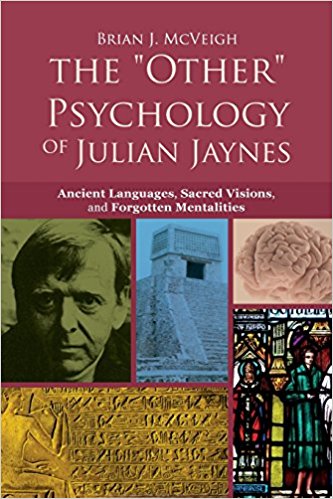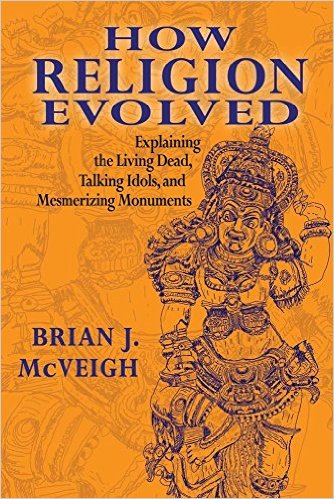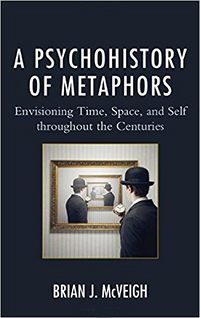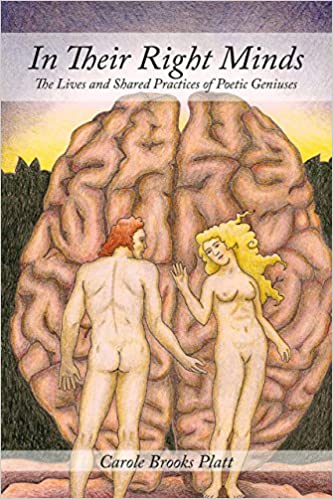Have you read the Julian Jaynes Society publications and Julian Jaynes’s The Origin of Consciousness in the Breakdown of the Bicameral Mind and are interested in delving deeper into Julian Jaynes’s theory? Discover more books related to Julian Jaynes’s theory of the origin of consciousness and the bicameral mentality.

|
The ‘Other’ Psychology of Julian Jaynes: Ancient Languages, Sacred Visions, and Forgotten Mentalities
Brian J. McVeigh (Imprint Academic)
Though often described as boldly iconoclastic and far ahead of its time, Jaynes’s thinking actually resonates with a “second” or “other” psychological tradition that explores the cultural-historical evolution of psyche. Brian J. McVeigh, a student of Jaynes, points out the blind spots of mainstream, establishment psychology by providing empirical support for Jaynes’s ideas on sociohistorical shifts in cognition. He argues that from around 3500 to 1000 BCE the archaeological and historical record reveals features of hallucinatory super-religiosity in every known civilization. As social pressures eroded the god-centered authority of bicamerality, an upgraded psychology of interiorized self-awareness arose during the Late Bronze Age Collapse.
|

|
The Psychology of the Bible: Explaining Divine Voices and Visions
Brian J. McVeigh (Imprint Academic)
The Psychology of the Bible explores how the Old Testament provides perspective into the tumultuous transition from an earlier mentality to a new paradigm of interiorized psychology and introspective religiosity that came to characterize the first millennium BCE. By examining the Old Testament’s historical background and theopolitical context, utilizing linguistic analysis, and applying systems and communication theory, this book interprets biblical passages through a new lens.
|

|
How Religion Evolved: Explaining the Living Dead, Talking Idols, and Mesmerizing Monuments
Brian J. McVeigh (Transaction Publishers)
Why did many religious leaders — Moses, Old Testament prophets, Zoroaster — claim they heard divine voices? Why do ancient civilizations exhibit key similarities, e.g., the living dead (treating the dead as if they were still alive); speaking idols (care and feeding of effigies); monumental mortuary architecture and houses of gods (pyramids, ziggurats, temples)? How do we explain strange behavior such as spirit possession, speaking in tongues, channeling, hypnosis, and schizophrenic hallucinations? Are these lingering vestiges of an older mentality?
|

|
A Psychohistory of Metaphors: Envisioning Time, Space, and Self through the Centuries
Brian J. McVeigh (Lexington Books)
How have figures of speech configured new concepts of time, space, and mind throughout history? Brian J. McVeigh answers this question in A Psychohistory of Metaphors: Envisioning Time, Space, and Self through the Centuries by exploring “meta-framing:” our ever-increasing capability to “step back” from the environment, search out its familiar features to explain the unfamiliar, and generate “as if” forms of knowledge and metaphors of location and vision. This book demonstrates how analogizing and abstracting have altered spatio-visual perceptions, expanding our introspective capabilities and allowing us to adapt to changing social circumstances.
|

|
In Their Right Minds: The Lives and Shared Practices of Poetic Geniuses
Carole Brooks Platt (Imprint Academic)
In 1976, Julian Jaynes proposed that the language of poetry and prophecy originated in the right, “god-side” of the brain. Current neuroscientific evidence confirms the role of the right hemisphere in poetry, a sensed presence, and paranormal claims as well as in mental imbalance. Left-hemispheric dominance for language is the norm. An atypically enhanced right hemisphere, whether attained through genetic predisposition, left-hemispheric damage, epilepsy, childhood or later traumas, can create hypersensitivities along with special skills. Dissociative “Others” may arise unbidden or be coaxed out through occult practices. Based on nearly twenty years of scientific and literary research, this book enters the atypical minds of poetic geniuses – Blake, Keats, Hugo, Rilke, Yeats, Merrill, Plath and Hughes – by way of the visible signs in their lives, beliefs, and shared practices.
|

|
Of Two Minds: Poets Who Hear Voices
Judith Weissman (Wesleyan University Press)
Contains a lengthy discussion of the Iliad and the Odyssey with regard to Julian Jaynes’s theory of the origin of consciousness and the bicameral mind, as well as discussion and analysis of hallucinations and poetic inspiration in a variety of poets.
|
Books on Julian Jaynes’s Theory for Italian Readers
Bicameral Mind-Inspired Fiction
Books Referencing Julian Jaynes’s Theory
The Iliad – Full Text
The Odyssey – Full Text





